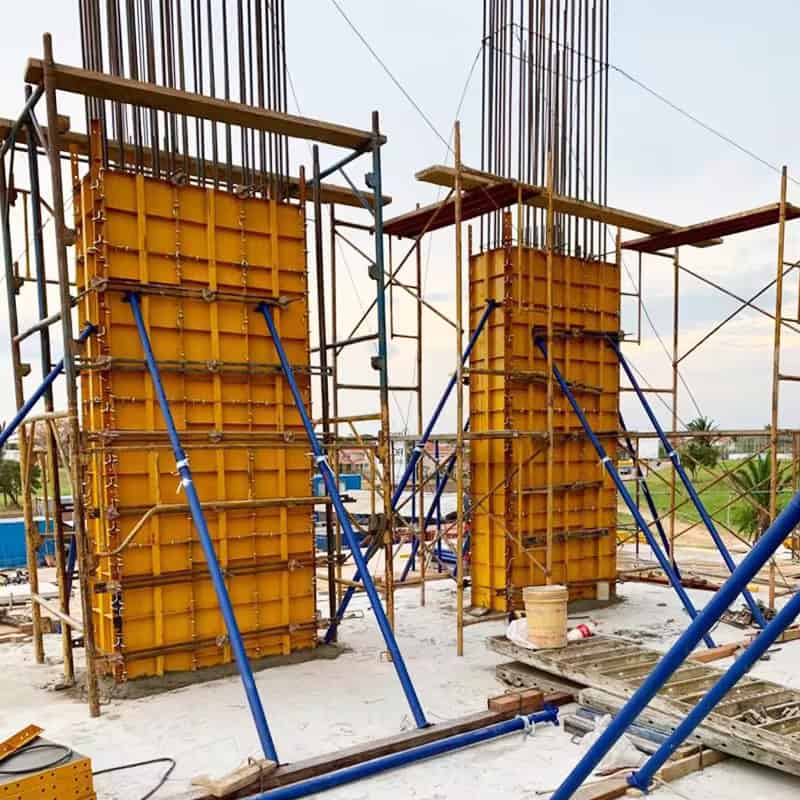Which Is the Best Formwork System for Retaining Walls?

Struggling to find the right formwork for retaining walls? Choosing the best system ensures durability, efficiency, and safety, helping you achieve precise results in construction projects of all sizes.
The best formwork systems for retaining walls include steel formwork, modular formwork, and aluminium systems. These options provide strength, reusability, and efficiency, making them ideal for ensuring the stability and precision of retaining walls.
Below, we explore the top formwork systems for retaining walls, their features, advantages, and factors to consider, helping you choose the best option for your construction needs.
What Are the Key Features of a Good Formwork System for Retaining Walls?
Want reliable support for retaining walls? Good formwork systems offer strength, adaptability, and efficiency, ensuring stability and quality in concrete casting for vertical structures.
A good formwork system for retaining walls should be durable, easy to assemble, and reusable. It must withstand high pressure from concrete and provide a smooth surface finish.
A good formwork system for retaining walls must meet several key criteria:
- Durability: Capable of withstanding the lateral pressure exerted by fresh concrete.
- Ease of Assembly: Modular systems that are quick to install and dismantle save time and labor.
- Reusability: High-quality materials like steel or aluminium enhance cost efficiency through multiple uses.
- Surface Finish: Ensures smooth and even concrete surfaces, reducing the need for post-casting corrections.
- Adaptability: Allows flexibility for different wall heights and thicknesses.
By meeting these criteria, formwork systems ensure stability and precision in constructing retaining walls.
What Are the Most Commonly Used Formwork Systems for Retaining Walls?
Confused about which formwork to use? Popular systems like steel, aluminium, and modular formworks offer strength, efficiency, and adaptability for constructing durable retaining walls.
Commonly used formwork systems for retaining walls include steel formwork for strength, aluminium formwork for lightweight efficiency, and modular formwork for adaptability. Each option suits specific project requirements.
The most commonly used formwork systems for retaining walls are:
- Steel Formwork: Known for its durability and ability to withstand high pressures, making it ideal for large retaining walls.
- Aluminium Formwork: Lightweight and easy to handle, offering excellent reusability and corrosion resistance.
- Modular Formwork: Prefabricated systems that are highly adaptable and efficient, suitable for projects requiring different wall dimensions.
- Plywood Formwork: Cost-effective and versatile but less durable compared to steel or aluminium.
Each system offers unique benefits, and the choice depends on factors such as budget, project scale, and specific structural requirements.
Why Is Steel Formwork Considered the Best Option for Retaining Walls?
Need unmatched strength and durability? Steel formwork provides superior resistance to pressure, ensuring safety and precision in constructing robust retaining walls for heavy-duty applications.
Steel formwork is ideal for retaining walls due to its durability, reusability, and ability to withstand high lateral pressure from concrete. It offers excellent surface finishes and long-term cost efficiency.
Steel formwork is often considered the best option for retaining walls due to its outstanding features:
- Strength: Can handle high lateral pressures from fresh concrete, ensuring structural stability.
- Durability: Resistant to wear and tear, making it suitable for multiple uses.
- Surface Quality: Produces smooth and precise concrete finishes, minimizing the need for additional treatment.
- Reusability: Reduces overall costs in large-scale projects.
While the initial cost of steel formwork is higher, its durability and efficiency make it a preferred choice for retaining walls in commercial and industrial construction.
How Does Modular Formwork Compare to Traditional Systems for Retaining Walls?
Looking for modern solutions? Modular formwork offers enhanced efficiency, adaptability, and ease of use, outperforming traditional systems in projects requiring flexibility and quick assembly.
Modular formwork provides flexibility and efficiency, outperforming traditional systems in adaptability and reusability. Its prefabricated panels are easy to assemble, making it suitable for complex retaining wall projects.
Modular formwork systems are gaining popularity for retaining walls due to their innovative design and functionality. Compared to traditional timber or plywood systems, modular formwork offers:
- Prefabrication: Panels come ready-to-use, reducing assembly time.
- Adaptability: Easily adjusted to accommodate varying wall dimensions.
- Reusability: Made from durable materials like aluminium or plastic, modular formwork can be reused multiple times.
- Labor Efficiency: Requires less skilled labor for installation.
While modular formwork has a higher upfront cost, its efficiency and reusability make it a cost-effective solution for retaining walls in modern construction.
What Factors Should You Consider When Choosing a Formwork System for Retaining Walls?
Unsure about the best choice? Factors like budget, wall dimensions, and material quality play a critical role in selecting the right formwork system for retaining walls.
Consider factors such as cost, durability, reusability, and ease of assembly when selecting a formwork system for retaining walls. Assessing project-specific requirements ensures the best results.
Choosing the right formwork system for retaining walls requires evaluating several factors:
- Budget: Determine whether the project can support higher upfront costs for reusable systems like steel or aluminium.
- Wall Dimensions: Ensure the system can accommodate the required height and thickness.
- Project Timeline: Systems that are quick to assemble, like modular formwork, help meet tight deadlines.
- Material Quality: Opt for durable and corrosion-resistant materials to maximize reusability.
- Surface Finish Requirements: Select systems that provide smooth finishes to minimize post-construction work.
By carefully considering these factors, construction teams can select the most effective formwork system for their specific needs.
Conclusion
The best formwork system for retaining walls depends on project requirements. Steel and modular formworks stand out for their strength and efficiency, while aluminium offers lightweight versatility. Evaluating factors like budget, durability, and adaptability ensures an optimal choice for high-quality and durable construction.
